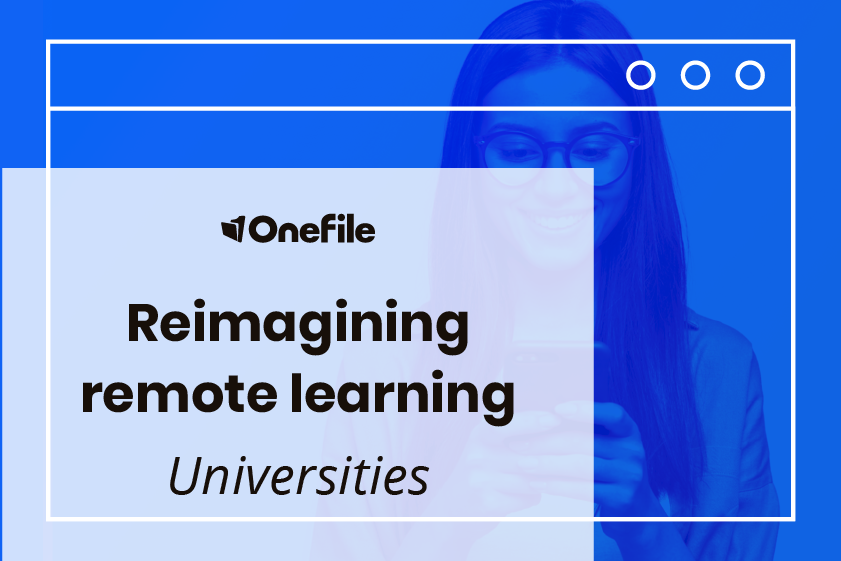Reimagining remote learning post Covid-19: universities

Since the Covid-19 lockdown came into place, HEIs have had to adapt to 100% remote delivery. In a sector not known for its flexibility, this has been a challenge for many universities – especially due to the hybrid nature of degree apprenticeship delivery.
Other the last few months, we’ve heard some great examples of how HEIs have successfully transformed their delivery, so we wanted to bring them together to share their experiences with other HEIs. On the panel, we invited Karen Squire and Rachael Johnstone from the University of Exeter and Jonathon Lawson from Manchester Metropolitan University to share their challenges, successes and top tips for other HEIs.
Jonathon Lawson started the panel with their biggest challenge – moving pedagogy online very quickly. They were fortunate as they’d already implemented blended learning in their degree apprenticeship delivery, so it was just a transition from partial online delivery to 100% remote.
They reassured their employers that they’d continue to deliver a high-quality product. They also spoke to apprentices to let them know the university was thinking about them, understood their circumstances and was taking on their feedback.
“We wanted to make sure we were delivering interesting learning experience. The idea of doing a 3-hour lecture via webinar doesn’t fill anyone with delight, so we had to think differently and embrace the benefits online learning brings.”
With online delivery, tutors are able to personalise learning for each student. This is especially important in degree apprenticeships as cohorts include a wide range of ages, backgrounds and job roles. Jonathon leveraged the opportunity of online learning to create group workshops, reflective tasks and seminar activities that enabled students to draw directly from their job role.
“Online learning has some great advantages for us that classroom learning simple doesn’t.”
Rachael from Exeter University agreed. They embraced the benefits of online learning, but didn’t want to lose the impact of their face-to-face masterclasses with industry experts. Before lockdown started, they booked their tutors and industry speakers into recording studios so they could create digital versions of the lectures they usually deliver in person. They then syncronised learning activities around the content.
“We also had daily meetings to discuss how we could use technology to replicate the social networking and peer-to-peer learning that classroom teaching offers.”
Maintaining social interaction and safeguarding learners was really important to Karen’s role too. They’ve introduced virtual drop-in sessions every week for all their apprentices. They don’t have an agenda – they give learners the opportunity to ask questions, get extra support or just have a catch up.
“Our tripart reviews took on a whole new meaning. We introduced a new review type on OneFile around wellbeing to support students during this time.”
Both Exeter University and Manchester Metropolitan University already had platforms in place – like Moodle, OneFile and Zoom – to support their online offering.
For Karen, the reports on OneFile have really come into their own. They use reports to monitor engagement and progress. They can quickly identify trends to see where they need to adjust and pivot – either for individual learners, cohorts or even organisations.
“I love the activity report on OneFile. I log in every week and I can see if an apprentice has logged in and what they’ve done. If an apprentice hasn’t engaged meaningfully with OneFile, I can then contact the tutor or employer to reach out to the apprentice. It gives us the insights we need to offer wellbeing support or help apprentices work more effectively.”
During the Covid-19 situation, learners have learned new skills around time management and crisis management. At Exeter University, Karen said they want their learners to reflect on this learning and apply it to their professional practice, so they encourage apprentices to capture their recent experiences and lessons learned in the learning journal.
Another OneFile feature that’s really helped during lockdown is the off-the-job training tracker. Rachael explained how it’s been an important tool to track progression, but also for employer engagement. Employers can log in to see exactly what their learners have achieved and support them online.
OneFile has helped Jonathan engage with employers too. Their employers and learners are really happy with how they’ve used technology in response to the crisis, but he recognises that their expectations are only going to increase as the dust settles.
“Technology has been absolutely crucial to changing our operations in this time – but we can't be in any way complacent. We have to keep developing our virtual delivery as the bar is always being raised.
Take the best of online learning experiences, react to specific employer needs and blend them with what you were doing before to deliver fantastic results. The world is changing, and we need to change with it.”
To hear all the advice our panelist had to share, watch the full webinar here.
Or to find out how you can use OneFile to deliver degree apprenticeships remotely, book a demo with a member of our team.
This article includes research and opinion sourced by OneFile at the time of publication. Things may have changed since then,
so this research is to be used at the reader's discretion. OneFile is not liable for any action taken based on this research.


